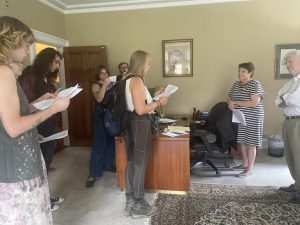
by Emily Simons, Opinions Editor
Africa: Newspaper Ban and Growing Human Rights Issues in Tanzania
After reporting on the number of Tanzanians taking drugs to treat HIV, authorities temporarily banned The Tanzania Daima, a daily newspaper. Since 2015, three opposition newspapers and two radio stations have been temporarily shut down. Government authorities used a 2015 law affording them power to regulate content on public safety and national security to shut down different agencies. Authorities claim the news outlets are spreading false information, yet others worry about a freedom of the press. Notably, under the leadership of President John Magufuli, the Tanzanian government has also been restricting minority activism (specifically LBGT issues) and political opposition.
Asia: Rohingya Genocide Crisis: Deal between Myanmar and Bangladesh
More than half a million Rohingyan people have fled into Bangladesh from Myanmar to escape ethnic cleansing in the past couple months. The Myanmar military claims it is fighting militants within the Muslim minority group, yet the U.N. declared the actions as ethnic cleansing. The United States has withdrawn military support from Myanmar and Secretary of State Tillerson along with other foreign leaders called for peace talks. Trying to mediate the situation Myanmar and Bangladesh began working on repatriation efforts for the Rohingya, but Myanmar must recognize the minority group and begin allowing the Rohingya citizenship.
Europe: Growing Tensions in Catalonian Independence Referendum
The Spanish government wrestles for control over the northeastern Catalonian region, after their independence referendum. With the Spanish government calling the vote illegal, protests erupted through the region. Catalonia already held a large amount of autonomy relative to other regions in the country, similar to a U.S. state, with only foreign affairs, fiscal policy, and military action remaining in Spanish federal control. The Spanish government is ready to take direct control over the region with the federal and Catalonian police force. Yet, members of the police force feel conflicted over which politicians to listen to. Tensions will remain high within the country as protests for Catalonian autonomy remain and the Spanish government act on the conflict.
Middle East: Qatar Facing Sanctions from Neighboring Nations
Qatar, with a long history of supporting terrorist groups, failed to accept the six principles its neighboring countries adopted in their efforts to combat terrorism. After not complying with the original 13 demands, Qatar was given an ultimatum of accepting six which it again declined. Now the country faces severe consequences as Saudi Arabia, Bahrain, the U.A. E., Yemen and Egypt join forces to place sanctions and restrictions on the country. In the first four weeks of sanctions, Qatar’s stock market fell 10%, losing 15 billion dollars, mostly due to Saudi Arabia closing its border with the country. In order for the restrictions to end, the neighboring countries most notably demand that Qatar cut diplomatic ties with Iran, cut ties with terrorist organizations, shut down state news funded outlets (Al Jazeera), close a Turkish military base, and align with other Arab countries in all ways to create a united front against terrorism.
North America: Face Veil Ban in Québec Spurs Controversy
The Canadian province of Québec, recently passed a “Religious Neutrality Law” which requires anyone to uncover their face while giving or receiving public services. The law does not specifically mention clothing but targets women wearing niqabs or burqas. Québec opposition parties wanted the bill to go further and restrict any religious symbols in the public sphere, modeling existing French secular laws. The law would reach deeply into public life, with people even having to uncover their face when riding buses or trains. Many in the Canadian government oppose the law, expecting it to be changed or taken to the Supreme Court in coming months.
South America: Human Rights in Venezuela
The European Union awarded the Sakharov prize to political prisoners in Venezuela. The Sakharov prize, named for Andrei Sakharov, recognizes persons fighting for freedom of thought. The Venezuelan government jailed countless political protestors during the political and economic crisis in the country. President of the European Union, Antonio Tajani, gave the prize in total support of the democratic opposition within the country in their fight to preserve democracy, freedom, and human rights. The award is also extremely powerful after the Venezuelan Foreign Minister Jorge Arreaza accused the United Nations of falsely reporting the extent to which Venezuelan security forces treat anti-government protestors. Within Venezuela there are more than 500 political prisoners.
South Pacific: New Zealand Renews Offer of Asylum to Australian Detainees
New Zealand’s Prime Minister Jacinda Ardern says the country is still willing to act on its 2013 offer of bringing in Australian off-shore detention refugees. Australia currently houses 2,000 people seeking asylum from Nauru and Papua New Guinea. Prime Minister Ardern noted New Zealand could bring in 150 refugees as they increase their refugee quota in 2018. Her renewed efforts to help refugees’ earn New Zealand citizenship and enter the country have been met with opposition by the Australian Parliament, who voted against the deal. Prime Minister Ardern will continue working on the measure as the United Nations warns of a humanitarian crisis with the detention center due to close next week.






